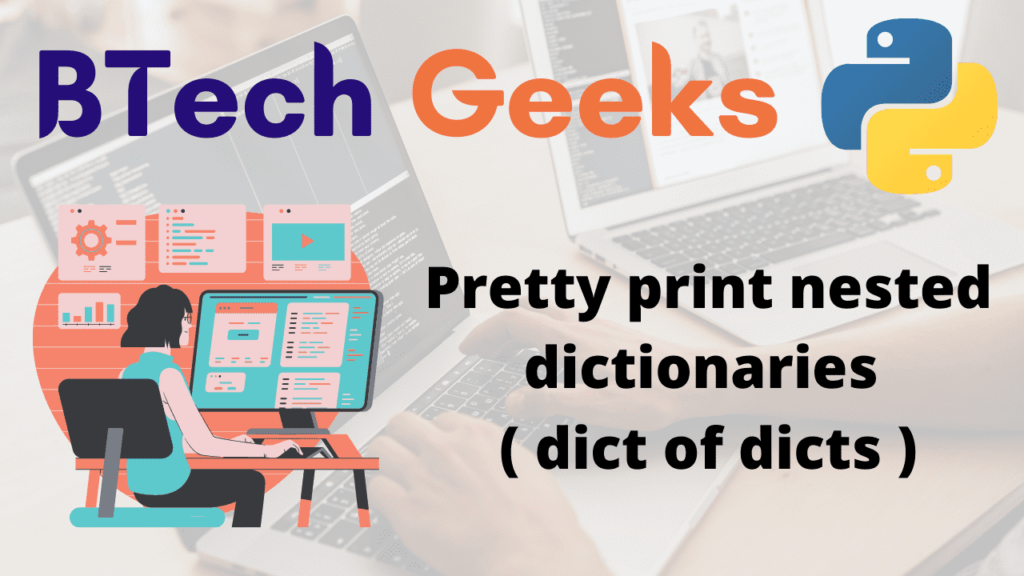Dictionaries are Python’s implementation of an associative list, which may be a arrangement . A dictionary may be a collection of key-value pairs that are stored together. A key and its value are represented by each key-value pair.
To an infinite depth, a dictionary may include another dictionary, which can contain dictionaries, and so on. This is referred to as a nested dictionary.
Nested dictionaries are one among several ways during which structured information is represented (similar to records or structures in other languages).
In this article, we’ll look at how to print a nested dictionary in a visually beautiful and readable format.
Examples:
Input:
nesteddict = {
'hello': {'www': 100, 'yyy': 'Helloworld'},
'this': {'www': 'vikram', 'age': 20, 'DOB': 'FEB'},
'BTechGeeks': {'PLACE': 'HYDERABAD', 'PINCODE': 500000,
'PYTHON': {'FUNCTIONS': 'Built in', 'year': 1999}},
}
Output:
{
"hello": {
"www": 100,
"yyy": "Helloworld"
},
"this": {
"www": "vikram",
"age": 20,
"DOB": "FEB"
},
"BTechGeeks": {
"PLACE": "HYDERABAD",
"PINCODE": 500000,
"PYTHON": {
"FUNCTIONS": "Built in",
"year": 1999
}
}
}
Print nested dictionaries in pretty way
There are several ways to print nested dictionaries in pretty way some of them are:
1)Using generic function
We can only call the values() function of a dictionary for a normal dictionary to get an iterable sequence of values. However, a value can be another dictionary object in a nested dictionary. To do this, we need to call the values() function again and get a new iterative sequence of values and search for dictation objects in those values. This is possible with recurrence in a simple way.
To print all of the key-values in this dictionary, we wrote a function that will recursively go through the nested dictionary and print all of the key-values.
Below is the implementation:
def printNested(nesteddict):
# Traverse the dictionary
for key, value in nesteddict.items():
# If the value is of the dictionary type, then print
# all of the key and values within the nested dictionary.
if isinstance(value, dict):
print(key, " : {\n")
printNested(value)
print("\n}\n")
else:
print("\t", key, " : ", value)
# given nested_dictionary
nesteddict = {
'hello': {'www': 100, 'yyy': 'Helloworld'},
'this': {'www': 'vikram', 'age': 20, 'DOB': 'FEB'},
'BTechGeeks': {'PLACE': 'HYDERABAD', 'PINCODE': 500000,
'PYTHON': {'FUNCTIONS': 'Built in', 'year': 1999}},
}
# passing nested dictionary to printNested Function
printNested(nesteddict)
Output:
hello : {
www : 100
yyy : Helloworld
}
this : {
www : vikram
age : 20
DOB : FEB
}
BTechGeeks : {
PLACE : HYDERABAD
PINCODE : 500000
PYTHON : {
FUNCTIONS : Built in
year : 1999
}
}
2)Using json module
Rather than writing our own functions, we can use the json module to print a dictionary of dictionaries in a format that looks like json.
Below is the implementation:
import json as json
# given nested_dictionary
nesteddict = {
'hello': {'www': 100, 'yyy': 'Helloworld'},
'this': {'www': 'vikram', 'age': 20, 'DOB': 'FEB'},
'BTechGeeks': {'PLACE': 'HYDERABAD', 'PINCODE': 500000,
'PYTHON': {'FUNCTIONS': 'Built in', 'year': 1999}},
}
# using json to print the nested dict
print(json.dumps(nesteddict, indent=4))
Output:
{
"hello": {
"www": 100,
"yyy": "Helloworld"
},
"this": {
"www": "vikram",
"age": 20,
"DOB": "FEB"
},
"BTechGeeks": {
"PLACE": "HYDERABAD",
"PINCODE": 500000,
"PYTHON": {
"FUNCTIONS": "Built in",
"year": 1999
}
}
}
3)Using pandas to print as table
We can print the nested dictionary a table using the pandas module.
Below is the implementation:
import pandas as pd
# given nested_dictionary
nesteddict = {
'hello': {'www': 100, 'yyy': 'Helloworld'},
'this': {'www': 'vikram', 'age': 20, 'DOB': 'FEB'},
'BTechGeeks': {'PLACE': 'HYDERABAD', 'PINCODE': 500000,
'PYTHON': {'FUNCTIONS': 'Built in', 'year': 1999}},
}
print(pd.DataFrame(nesteddict).T)
Output:
DOB PINCODE PLACE ... age www yyy hello NaN NaN NaN ... NaN 100 Helloworld this FEB NaN NaN ... 20 vikram NaN BTechGeeks NaN 500000 HYDERABAD ... NaN NaN NaN [3 rows x 7 columns]
Related Programs:
- python how to iterate over nested dictionary dict of dicts
- python print items of a dictionary line by line 4 ways
- python convert list of lists or nested list to flat list
- python get number of elements in a list list of lists or nested list
- python print all values of a dictionary
- python print all key value pairs of a dictionary
- python read csv into a list of lists or tuples or dictionaries import csv to list
